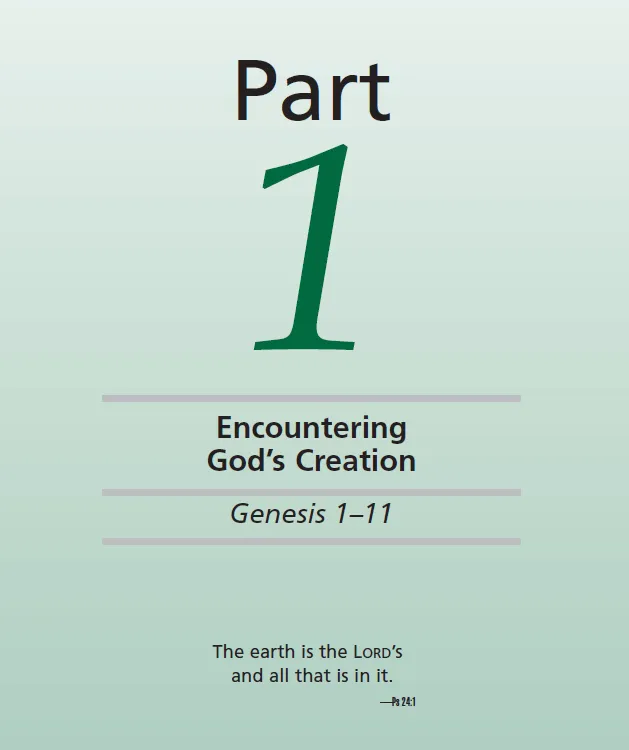
eBook - ePub
Encountering the Book of Genesis (Encountering Biblical Studies)
Arnold, Bill T.
This is a test
Partager le livre
- 232 pages
- English
- ePUB (adapté aux mobiles)
- Disponible sur iOS et Android
eBook - ePub
Encountering the Book of Genesis (Encountering Biblical Studies)
Arnold, Bill T.
Détails du livre
Aperçu du livre
Table des matières
Citations
À propos de ce livre
This accessible introduction to the Book of Genesis examines introductory issues, overarching themes, and the overall argument of the book.
Foire aux questions
Comment puis-je résilier mon abonnement ?
Il vous suffit de vous rendre dans la section compte dans paramètres et de cliquer sur « Résilier l’abonnement ». C’est aussi simple que cela ! Une fois que vous aurez résilié votre abonnement, il restera actif pour le reste de la période pour laquelle vous avez payé. Découvrez-en plus ici.
Puis-je / comment puis-je télécharger des livres ?
Pour le moment, tous nos livres en format ePub adaptés aux mobiles peuvent être téléchargés via l’application. La plupart de nos PDF sont également disponibles en téléchargement et les autres seront téléchargeables très prochainement. Découvrez-en plus ici.
Quelle est la différence entre les formules tarifaires ?
Les deux abonnements vous donnent un accès complet à la bibliothèque et à toutes les fonctionnalités de Perlego. Les seules différences sont les tarifs ainsi que la période d’abonnement : avec l’abonnement annuel, vous économiserez environ 30 % par rapport à 12 mois d’abonnement mensuel.
Qu’est-ce que Perlego ?
Nous sommes un service d’abonnement à des ouvrages universitaires en ligne, où vous pouvez accéder à toute une bibliothèque pour un prix inférieur à celui d’un seul livre par mois. Avec plus d’un million de livres sur plus de 1 000 sujets, nous avons ce qu’il vous faut ! Découvrez-en plus ici.
Prenez-vous en charge la synthèse vocale ?
Recherchez le symbole Écouter sur votre prochain livre pour voir si vous pouvez l’écouter. L’outil Écouter lit le texte à haute voix pour vous, en surlignant le passage qui est en cours de lecture. Vous pouvez le mettre sur pause, l’accélérer ou le ralentir. Découvrez-en plus ici.
Est-ce que Encountering the Book of Genesis (Encountering Biblical Studies) est un PDF/ePUB en ligne ?
Oui, vous pouvez accéder à Encountering the Book of Genesis (Encountering Biblical Studies) par Arnold, Bill T. en format PDF et/ou ePUB ainsi qu’à d’autres livres populaires dans Theology & Religion et Biblical Studies. Nous disposons de plus d’un million d’ouvrages à découvrir dans notre catalogue.
Informations
Sujet
Theology & ReligionSous-sujet
Biblical Studies
1 The Grandeur of God’s Perfect Creation
Genesis 1:1–2:3
By the word of the LORD were the heavens made,
their starry host by the breath of his mouth. . . .
For he spoke, and it came to be;
he commanded, and it stood firm.
—Ps 33:6, 9
How often do you think about beginnings—the beginning of life, the beginning of the world, the beginning of civilization? Such questions were a constant source of speculation among all ancient peoples, including the Israelites. These questions have occupied the human mind since earliest civilization.
The Bible opens with a book of beginnings, Genesis. The word “genesis” itself is the Greek title of the book, meaning “origins.” The Jews called it by the first Hebrew word, bĕrēʾšît, “In the beginning.” As a book of beginnings, Genesis deals with the beginning of the world, the beginning of history, the beginning of sin, salvation, and God’s people.
How Did It All Begin?
We humans have always been impressed, even awestruck, by this spectacular world around us. From the first primitive observations of celestial movements recorded by the ancient Babylonians to the remarkable photographs of earth taken by NASA’s shuttles—all of us recognize the splendor of this universe.
It is surprising how little we actually know about the process of creation. After all, the Bible itself makes this one of the central issues of Christian thought. Here in the opening books of the Bible, creation is the foundation of Mosaic law. Later, creation becomes the psalmists’ reason for praising God (Pss 19:1–6; 104:24–30) and Job’s answer to the problem of evil (Jb 38). The grandeur of God’s creation became the prophetic paradigm for restoration (Is 66:22–23) and the opening salvo in the Gospel of John (Jn 1:1–5).
Yet as important as creation is theologically, the precise details of the process of creation seem unimportant in the opening chapters of Genesis. As one author has put it, “The question, what was created, precedes the question, how did creation take place.”[1]
Our lack of information leads to many controversies related to creation. Many Christians get caught up in debates about the “day-age theory,” the “gap theory,” or the ever troublesome question of evolution. If modern geologists are correct and the earth is 4.5 billion years old, did God suddenly create an earth that just appears old, or is some form of theistic evolution appropriate? Can one accept an old earth while rejecting evolution? Though these questions are important and necessary to address, they are not the main concern of the biblical accounts of creation.

Genesis 1 puts the beauty and grandeur of creation in perspective.
So why do we not have more information on the details of creation? Apparently the Bible is more concerned with something besides these controversial issues. We must conclude, as Christian readers, that God intends us to glean something else from these chapters, something more obvious. Though we will address these controverted questions briefly, our purpose will be to seek to determine the central messages of the Bible’s accounts of creation.
Details of Genesis 1
Genesis 1 is the overture of what may well be called the world’s greatest literary masterpiece. Its elevated style is more like poetry and the unit is unique when compared to the narrative sections you will read elsewhere in Genesis. We shall begin by looking at the recurring pattern and the symmetry of the chapter, and then ask how the first two verses relate to the whole.
The Recurring Creation Formula
As you read Genesis 1 (or, more specifically, Gn 1:1–2:3), you should note the recurring pattern that gives structure to the whole.[2] A characteristic feature of the chapter is the author’s use of this literary pattern to introduce each day of creation.
- Introduction: “And God said . . .”
- Command: “Let there be/let it be gathered/let it bring forth”
- Report: “And it was so”
- Evaluation: “And God saw that it was good”
- Time sequence: “And there was evening, and there was morning”
There is some degree of variation in the use of this recurring formula. But one constant is the divine evaluation that each element of God’s creation is “good” (Hebrew ṭôb). In its use in chapter 1, the term does not seem to have moral or ethical connotations, as in “good” as opposed to “bad” or “evil,” such as is the case in Genesis 2. Here the idea is approval and acceptance. The object created is just as it should be, with no flaws or blemishes. On each creation day, God is the gifted artist who steps back to admire and approve his own work. When God considers his handiwork, he is pleased with it.
The role of humankind in creation is emphasized by the activity of God on the sixth day of creation (1:24–31). This time the recurring formula includes the divine evaluation with a subtle change. When God inspects his creation of man and woman, he deems them not just “good,” but “very good” (v. 31). The recurring formula gives the impression that humankind is the climactic moment of creation, and that God is more than well pleased with humans.
The Symmetry of Genesis 1
The use of the creative formula to introduce and conclude each day also creates an interesting symmetrical structure for Genesis 1.[3] The contents of the first three days of creation correspond to the last three days in a way that accentuates the third and sixth days. Days three and six correspond because they both contain two acts of creation: earth and vegetation on day three (vv. 9–13) and land animals and humans on day six (vv. 24–31). This correspondence of content is matched by literary form, since key elements of the creation formula are repeated for days three and six: the introduction (“And God said,” vv. 9, 11, 24, 26) and the divine evaluation (using ṭôb, vv. 10, 12, 25, 31).
Similar correspondences of content pair each of the other days of creation. The luminaries of day four correspond to the creation of light on day one. The birds and fish created on day five match the sky of day two. Furthermore, it may be that each set of three days was God’s response to the chaos and disorder of verse 2 (“formless and empty”), providing form and fullness. The first three days gave the earth shape and the last three filled it. If so, God’s blessing to animals and humans (“be fruitful and increase in number,” vv. 22 and 28) are ways in which we are to continue his creative activity. The “formless and empty” stage of creation simply means the earth was bare, an uninhabited place that now is to be populated and inhabited by humankind and the animals God has created.[4]
The recurrence of the creation formula and the symmetrical structure of the days of creation highlight the uniqueness of day seven (2:1–3). As the climax of creation, God’s Sabbath rest is not what we normally think of as “rest,” as though God needed a break from an exhausting job. Rather, the term fundamentally means “cessation,” and implies also the celebration and completion of an accomplishment. The concept became important for national Israel, and still holds hope for the Christian believer, since the creation story builds to this point and testifies that “with the living God there is rest.”[5] God pronounced the activity of each of the other days of creation as good, but this one he sanctified: “And God blessed the seventh day and made it holy” (2:3).
The Role of Genesis 1:1–2
As the important seventh day stands outside the purview of the creation formula, so do the first two verses of Genesis. These opening words of the Bible pose two interconnected questions, resulting in two mutually exclusive interpretations. First, we have to deal with the meaning of the first word of verse 1, bĕrēʾšît, traditionally translated “in the beginning.” Second, the answer to this question will impact how the first three verses relate to each other.
The issues involved in interpreting bĕrēʾšît are complicated and require some knowledge of Hebrew to understand fully.[6] In sum, the noun has a prefixed preposition in a form that would often take a definite article, especially for a phrase such as “in the beginning.” Without the definite article, this particular spelling of the word would normally occur in a bound or construct form with a following noun, a genitive. However, in Genesis 1:1 there is neither a definite article nor another noun bound to it as we would expect. For this reason, some scholars have argued the term is a dependent temporal clause: “In the beginning when God created. . . ,” or “When God began to create . . .” In this case, verse 1 would be dependent on the main clause of verse 2:...
